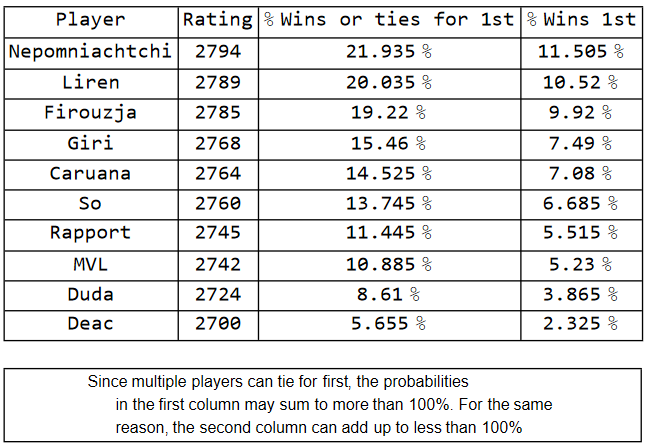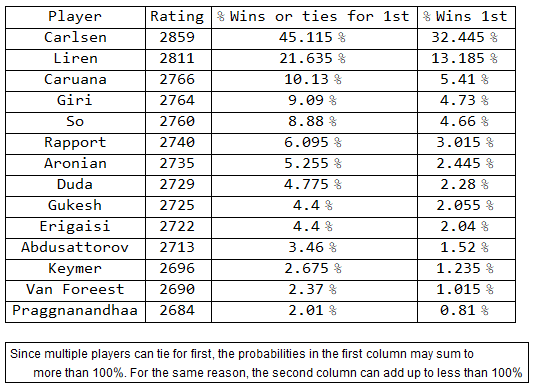Forecast for the Chennai Grand Masters:
Friday, December 15, 2023
Tuesday, November 21, 2023
Monday, October 2, 2023
The 2023 National Memory Championship
The host asked all the finalists why they decided to compete.
"Not sure exactly - it's very difficult and stressful."
That was my response. Back in July, I had made it through the qualifier (results). I won the numbers event, memorizing 80 digits perfectly in 31.92 seconds. This compensated for my performance in the other events. Then in September, I joined the other finalists and reigning champion John Graham in Orlando, Florida.
The first event was a Lumosity game, Pinball Recall.
Saturday, May 6, 2023
Wednesday, May 3, 2023
Wednesday, April 5, 2023
World Chess Championship 2023
Nepo and Liren are only 7 points apart, so there is a decent chance that the 14-game match will end in a draw (100% - 45.685% - 38.685% = 15.63%)
Saturday, March 18, 2023
MinStrength Methodology
In a game between Players A and B, there is a normal distribution centered at A’s rating and another centered at B’s rating. The standard deviation is 200. In the Elo system, the expected score for Player A is the probability that a random number from A’s distribution is higher than a random number from B’s. This seems to ignore the possibility of draws – there is a 0% chance that both random numbers are equal – but that will be addressed later. The expected score can be approximated with the logistic function:
Next, I model a tournament as n games against your
average opponent. This is an approximation (the expected score isn’t a linear
function, so a game against an 1800 followed by a game against a 2000 is slightly
different from playing two games against a 1900). With this assumption, your
score follows a binomial distribution. The mean is np and the variance
is np(1-p), where p is your expected score against the average
opponent. The issue with this binomial distribution is that there is no
accounting for draws. However, the binomial distribution converges to a normal
distribution, so I use that as an approximation. The normal distribution is
continuous, so scores such as 8.5 are possible. This means that we aren’t
ignoring draws.
Friday, February 10, 2023
Tuesday, January 3, 2023
Tata Steel 2023
Carlsen is the top seed in the 14-player round robin. I realize that I haven't been posting much lately. It's because there are not very many elite classical tournaments anymore. Blitz and rapid are taking over. Even at amateur tournaments, the time controls are shortening. Supposedly this will popularize chess. But after pushing blitz and rapid for decades, we're still having the same conversation about how to popularize chess. It hasn't worked.










